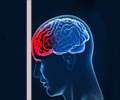It's estimated that more than a half million kids in the U.S. go to the hospital each year with a concussion. That's an average of a kid per minute- every minute
It's estimated that more than a half million kids in the U.S. go to the hospital each year with a concussion. That's an average of a kid per minute- every minute of every day. Some concussions are worse than others but it might surprise you to know that almost all of them are treated the same.
New research is pointing toward a more sophisticated way of diagnosing and treating concussions in kids.13 year old Dustin Edens had to work on his game by himself for a few days, after a recent run-in with a teammate during basketball practice.
"He drove right around the pick and came at me and hit me with his shoulder first, right into my chest, and my head bounced off the ground," says Dustin.
It was Dustin's third concussion in two months, although it might surprise you to know that it's often hard for doctors to tell where one concussion ends and another begins.
"We don't have tests that tell us when someone has recovered from their concussion," says Karl Klamar, MD at Nationwide Children's Hospital.
Instead doctors have to rely mostly on patients to tell them when they feel better. Things like headaches, fatigue, and irritability can all be signs that the concussion is lingering, and in some cases they can linger a long time.
Advertisement
To better understand which kids may be at risk Doctor Yeates, of Nationwide Children's Hospital followed nearly 200 children with concussions for a year. His study, published in Pediatrics, found that while most kids had few problems, one out of every four experiences significant post concussive symptoms, some of which never fully resolved. And those whose concussions resulted in a loss of consciousness, amnesia or an abnormal CT scan were more likely to have symptoms that persist.
Advertisement
Doctor Yeates believes classifying concussions as high risk or low risk may help physicians determine which patients need special attention, which could give them a better "shot" at a faster recovery.
Source-Eurekalert
SRM









